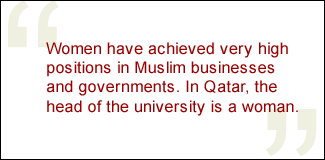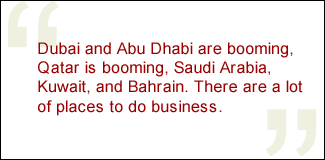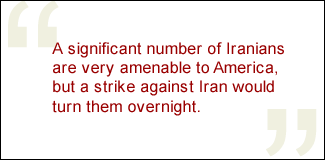The Middle East used to be mysterious to the West, but lately, many Western businesspeople are beginning to feel it's completely inexplicable. How can anyone even think of doing business there now, as Israel and Hezbollah are engaged in a bloody battle that could precipitate a wider war? Should companies invest in a region that may be on the cusp of nuclear proliferation? Will Iraq ever be stable? And while we're at it, why would some seemingly innocuous Danish cartoons inspire such a violent reaction?
These questions are the fulcrum on which billions of Western dollars teeter, and reliable answers are hard to find. That's why American and European businesspeople so often turn to John L. Esposito, Ph.D. Dr. Esposito is a university professor and a professor of religion and international affairs and of Islamic studies at Georgetown University and the founding director of Georgetown's Prince Alwaleed Bin Talal Center for Muslim-Christian Understanding in the Walsh School of Foreign Service. He is also the past president of the Middle East Studies Association of North America and the American Council for the Study of Islamic Societies and a consultant to governments and multinational corporations. He is editor in chief of the Oxford Encyclopedia of the Modern Islamic World and has authored more than 35 books, including What Everyone Needs to Know About Islam and Unholy War: Terror in the Name of Islam. Dr. Esposito is coauthor of the forthcoming book, Can You Hear Me? Listening to the Voices of a Billion Muslims.
 |
In Part One of this interview, Dr. Esposito dismissed the notion that there's an unbridgeable divide between the West and the Muslim world. (See "Looking For Business in the Muslim World" in the "See Also" area on this page.) In fact, Western business leaders have developed solid and productive relationships in the Middle East for many years -- and Dr. Esposito explained how others can do it too. In this interview, Part Two of the series, Dr. Esposito discusses why profound cultural misunderstandings -- like the Danish cartoon controversy of earlier this year -- are bad for East/West business relations; what businesswomen should do in sexually segregated countries; whether or not it's a good idea to invest in Muslim countries right now; and why the worst response to Iran's nuclear ambitions is violence.
GMJ: Let's start by going back a few months. Many Danish companies lost money in the Middle East because of the controversial cartoons of the Prophet Muhammad, yet many Westerners don't understand why those cartoons inspired rioting. Can you explain it?
Dr. Esposito: The 优蜜传媒Poll of the Muslim World can help people understand why the cartoon controversy occurred. What the poll showed is that if you ask Muslims what they admire about us, they say our technology and our freedoms. This goes against the conventional wisdom, post-9/11 in America. But when asked what the West can do to improve relations, they responded, "Stop denigrating our religion, thinking of Muslims and Arabs as inferior, and equating our religion with extremism."
Now, if you're doing business in the Middle East, it makes a difference if you understand this. Understanding these sentiments is crucial to understanding why the outrage over the cartoons was so broad-based -- even among educated professionals -- and why you wouldn't want to see your country inspiring that outrage.
If you knew these kinds of things would be controversial, you could distance yourself from them. You'd realize that there are economic implications to the Danish cartoons or, for that matter, the Dubai Ports World situation. These situations make it more difficult for businesspeople working overseas. If you want to continue to do business there, you must prove yourself within the society you're working in.
GMJ: How do Western women fare in Muslim countries? Should they work there at all?
Esposito: First of all, women have achieved some very high positions in Muslim businesses and governments. In Qatar, the head of the university is a woman. Pakistan has had a number of female ambassadors to America. So it's not true that women have no power or that they're not allowed out. And you also have to realize that even in sexually segregated countries like Saudi Arabia, many women have great wealth -- they own lots of real estate, and they own their own companies.
 |
I have a female friend who worked about ten years ago in the diplomatic corps in the Muslim world. In addition to that, she's Jewish. And she had no problem functioning in Saudi Arabia because people took for granted that she was an American; it wasn't like she was a Saudi woman. They respected her as a professional and what she was going to do there, and she was sensitive to the customs. You shouldn't go into any society and act and dress in a way that will be offensive to other people.
GMJ: So should businesswomen veil themselves?
Esposito: No. But I think that women should dress modestly, and a lot of women do wear pantsuits.
GMJ: Will Muslim men work for women? Not considering the fact that Muhammad did.
Esposito: It really depends on the country. Even in some parts of Pakistan, a country where many women have powerful positions, some men don't want to work for a woman. Many Muslim societies are patriarchal, so there are men who have issues in the way that they interact and respond to working for a woman or having their wife work. Some will say it's sexism in the name of religion, but it's patriarchy.
Among my father's generation of Italian-Americans in Brooklyn, it was humiliating if your wife [worked outside the home]. Not that they didn't -- my mother worked. But to have your wife working meant that you couldn't support her and the family.
I think when we look at these issues, we have to realize that there are also development issues involved here. We've got to think historically: Forty, fifty, or sixty years ago, how would comparable situations have been handled in America? How many men would have felt comfortable working for a woman or having their wives working? How many women were in any kind of managerial or senior positions?
Also, if you're a man working in a Muslim society, you don't invite women up to your room. I remember doing a consulting job for a very large, multinational company about fifteen years ago. Hopefully people are more sophisticated than this now, but at the end of the training session, this guy said to me, "Let's say I'm doing business in one of the countries in the Gulf, and I really get along with a woman from that society -- or even with an American or European counterpart. And let's say we want to go up to my room together. You're telling me I ought to think three times about it."
I told him that, yes, in that particular culture, it would be offensive, and he would stand out. And while there are a lot of businesspeople there, people are still aware. If they see traffic going in and out of a room, in that particular country, in that particular culture, it could boomerang on you. It's not that it's illegal, but word will get around.
GMJ: What do you think of investing in the Middle East, under current circumstances?
 |
Esposito: There are plenty of places in the Gulf where one can invest. I've been to the Gulf recently -- Dubai and Abu Dhabi are booming, Qatar is booming, Saudi Arabia, Kuwait, and Bahrain. There are a lot of places to do business. The number of construction projects -- like corporate centers, hotels, universities, you name it -- taking place in Doha, Dubai, and Abu Dhabi is beyond belief. Turkey is a possibility. American companies might be a heck of a lot more gun shy about Iran, but European countries are doing good business in Iran. It depends on the company, the company's profile, and where the company's going to do business. If I were advising somebody, I'd say Iraq is still a place where you can do business unless you're risk averse. You might be able to make big gains, but in terms of both security and the future, there are other places, like the Gulf, that are thriving. I'd go there.
GMJ: What about the Saudi Arabian economy?
Esposito: If you look at Saudi Arabia, it has bounced back economically in recent years. It's had problems with terrorism, but it's worked hard to counter that. While there have been problems in the past couple of years, Saudi Arabia is continuing to grow. Now, people will be a bit more cautious about Saudi Arabia, given recent history, than they are with other Gulf states. But many of the Gulf countries are places where there's wealth, where there's a booming growth of infrastructure, and there's business to be done. Many American and many, many European countries know that.
GMJ: What worries many businesspeople is the notion of perpetual instability in the Middle East. What if Iraq implodes?
Esposito: I don't think that there will be a significant spillover effect if the situation in Iraq gets worse. It all depends on how things are handled. In most Gulf countries, people are concerned about stability and security, like elsewhere in the world. They want to prosper, they want to be safe, they want to continue to enjoy a good quality of life, and they want to see that increase. They are concerned about what happens in countries in their region, but they are also concerned about heavy-handed, intrusive incursions into their [own] countries. So it's not simply Iraq unraveling that we have to worry about, but how Europe and America respond. If Europe and America do not screw up, then I don't see a tremendous spillover effect. I think the countries that will be affected already have been.
 |
GMJ: You've mentioned heavy-handed policies. What do you think the U.S. government needs to do to change this perception?
Esposito: Public diplomacy is important, but the challenge is that public diplomacy is not just about selling America and communicating who we are. It's also about our ability to listen and it's about our policies. Not "walking the talk" can backfire because it makes it look like you've been deceptive, hypocritical, and manipulative. You've got to win minds and hearts, and that happens people-to-people. We need exchanges and programs on both sides. We need to get to know each other better and understand our flashpoints better.
My center just received a $20 million endowment from Prince Alwaleed Bin Talal Alsaud. [See "Center for Muslim-Christian Understanding" in the "See Also" area on this page.] According to Forbes' recent survey, he's the eighth wealthiest man in the world. But because he studied in the United States, Alwaleed was very concerned about the relationship between the Arab and Muslim world and the West. And he's a businessperson. So he created two American studies programs in the Arab world, one at the American University of Beirut and one at the American University of Cairo, with the idea that Arabs need to understand America better. And now he's given twenty million dollars to Harvard and twenty million dollars to Georgetown to support or promote better understanding, knowledge, relations, and exchanges between our part of the world and the Muslim world.
This is analogous to what governments need to do. Some Americans, the Japanese a little more, but especially European corporations, have found they need to support projects that are generated by universities and others that deal with foreign policy, issues of relations between countries, and culture. They know this is good business and that promoting these better relationships actually works to their advantage.
GMJ: Iran is attempting to enrich uranium, and the United States contends Iran's real purpose is to build a nuclear arsenal. What are the implications of a nuclear-armed Iran?
Esposito: [Possessing nuclear weapons] is a strong playing card for the Iranians, and that's the card their president is going to play. And of course, the line in Iran on the question of nuclear capability vis-脿-vis nuclear threat will be that Israel has nuclear capability and Israel threatens to use it, and Israel does not comply with international inspections, so why can't Iran have it? When Iran looks at North Korea and the way it's able to, from time to time, push the United States and the West by playing the nuclear threat and then negotiating to get something else it wants, Iran will conclude that it's important to have nuclear weapons.
When you look at the political realities, you can see why an Iranian president would want to play that card because it has both a domestic capability and a nationalist capability, and it gives Iran a certain kind of international cach茅. However much the Iranian president may be viewed as a bad guy, he has a card to play to negotiate for other things. If Iran simply bows to the international community and has no developmental nuclear capability, what does Iran gain from that? Nothing. So it would be a terrible mistake for the West to threaten to hit Iran militarily to take out its nuclear capability. Making that kind of threat will mobilize all Iranians because they're scared by it, and it becomes a matter of national pride.
GMJ: How would military strikes on Iran affect the global marketplace?
Esposito: If the markets get nervous or they see Iran threatening [to achieve] nuclear capability, some might think that striking them will end everything. But military strikes will only result in less stability and security within Iran and the Gulf area. It would mobilize Iranians to become far more anti-American than the majority want to be. A significant number of Iranians are very amenable to America; they admire a good deal of what goes on in America. But a strike against Iran would turn them against America overnight. The reflexive reaction of Iranians would be to rally behind their country and their leader as America did after 9/11, regardless of what specific individuals think of that specific leader.
GMJ: Some people say that the usual deterrents to launching a nuclear war don't apply to people who believe if they die killing an infidel, they'll go to paradise. What do you think?
Esposito: I think that's totally off the wall. If you wound up with leadership in Iran that was literally, I mean this literally, crazy, that might be the case. But even people that you may not like can be intelligent and rational. It doesn't mean that they're nice guys. And no Iranian leader, unless he's out of his mind, will commit an action that he knows will bring about the destruction of his country. The reality is that Iran would be committing suicide if it were to engage in that kind of strike. And that's a good deterrent.
-- Interviewed by Jennifer Robison